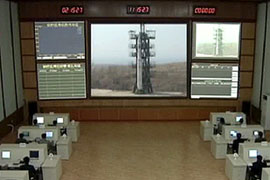N Korea resumes nuclear work
Pyongyang says plutonium extraction will help “bolster nuclear deterrence”.

The reclusive state struck a deal with China, Japan, Russia, South Korea and the US in 2007 to disable its Soviet-era Yongbyon nuclear plant in exchange for aid and an end to its international ostracism.
But it has since expelled UN and US nuclear inspectors at Yongbyon, about 100km north of the capital, Pyongyang, who had been overseeing steps to put the plant out of operation for at least a year.
Nuclear bombs
Experts say North Korea, which has enough material for six to eight nuclear bombs, wants to separate plutonium from spent fuel rods cooling at the Yongbyon plant, which could give it enough material for at least one more bomb.
They say it could take North Korea, which conducted its only nuclear test in October 2006, as little as three months to have the reprocessing facility up and running again, increasing the likelihood that it could conduct another nuclear weapons test.
Professor Yang Moo-Jin, from the University of North Korean Studies in South Korea, said: “It will then have produced some six to eight kilograms of weapons-grade plutonium, which can be used to produce one or two bombs,”
Other parts of the Yongbyon plant, which includes a nuclear fuel fabrication facility and a reactor, may be beyond repair, they said.
North Korea will stay away from international nuclear disarmament talks, Russia’s foreign minister said on Friday after visiting Pyongyang and pressing North Korea to return to the discussions.
Sanctions
The decision by the UN North Korea sanctions committee on Friday marks the first concrete action by the UN against Pyongyang for its April 5 rocket launch.
Saturday’s announcement has been seen as a response by North Korea to the sanctions.
 |
| Critics say the rocket launch was part of a programme to develop ballistic missiles [EPA] |
The committee agreed on the sanctions before the deadline set by the security council to produce a list of goods and North Korean entities to be blacklisted under resolution 1718, passed in 2006 after Pyongyang’s nuclear test.
The three entities accused – The Korea Mining Development Trading Corporation, Korea Ryongbong General Corporation and Tranchon Commercial Bank – have perceived links to the military and were involved in financing North Korea’s ballistic missile and other weapons programmes.
The sanctions will prevent the companies from doing business with any other company or nation, though the real impact from the decision may remain symbolic.
North Korea said that its April 5 launch put a satellite into orbit to broadcast patriotic songs from the communist dynasty.
But no other nation has confirmed that the satellite was in orbit.
The US claims that North Korea fired a rocket over Japan as part of its programme to develop long-range ballistic missiles that could conceivably hit the US in the future.